Exclusively for culturally-curious future social workers & counselors who want better Spanish...
We are looking for 35 adventurous social sciences students willing to leave their egos (and their comforts) behind and spend half the summer getting their hands dirty in Peru.
Learn how to apply for one of 35 spots and spend 6 weeks in Lima with fellow like-minded students, observing and assisting social workers in real Peruvian organizations and moving your Spanish from a state of "awkward timidity" to one of "absolute confidence" - all while having one of your life's greatest experiences - one you'll still be talking about 25 years from now.
"I'm so glad I came. My speaking and listening skills have improved so much. It was a great cultural experience."
Warning: Spending the Summer in Peru is NOT for Everyone
Are you willing to make a few sacrifices while you greatly improve your Spanish AND your grad school and career positioning?
Our summer program is not for everyone. It requires you to live for several weeks in a foreign country - away from the people (and the comforts) you know.
It will be a challenge and many college students do not yet have the courage to succeed. Some even beg to go back home shortly after arriving in Lima, quickly realizing they are "not in Kansas anymore".
Frankly, if you don't adapt well to new surroundings, you are not ready for Peru.
This is not a travel-oriented program where you'll be taking pictures to show off to your friends back home.
In fact we recommend leaving your camera behind much of the time.
If your idea of going abroad is to relax in a quaint foreign playground, you'll be very disappointed. You probably shouldn't be on this page.
But you are in the right place if...
- You are aware that Spanish is increasingly necessary for a human services career in the United States, in many cases a strict requirement to even get interviewed.
- You know that without mastering Spanish, you’ll be doing a disservice to, and perhaps even putting at serious risk, a large portion of the population.
- You are curious about other cultures, and you want to see how another society's social system operates. - how a “third world country of limited resources” still makes things work.
- You like the idea of traveling abroad, forming new relationships, and accumulating travel stories you’ll still be telling 30 years from now.
- You can step out of your comfort zone and live in unusual surroundings, try foods you don't usually eat, and meet people far different than your friends and family back home.
- You do not want to do the program merely to "stack the deck" on your graduate school application or to "fill out your resume" as a tie-breaker, but to genuinely become someone capable of helping Spanish-speaking patients, understanding not only their language, but also their cultural backgrounds.
If you identify with the above, and know that a summer in Peru could improve your career, as well as the people you'll help along the way, please keep reading.
You will learn how to not only greatly improve your Spanish, gain counseling field exposure, and deep-dive into Peruvian culture, but also how to stand out in a competitive applicant crowd in a way that transgresses GPAs and certifications.
"What Level of Spanish is Required?"
No prior Spanish is required to participate in the program.
Our goal is to significantly improve your Spanish, whatever your starting point may be.
Some students start as complete beginners; others are very advanced.
We have appropriate classes for all levels.
"So what is 'Ecela' anyway?"
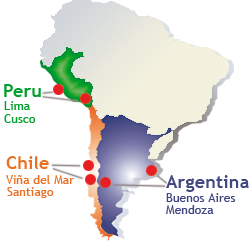
Ecela is an acronym for "Español y Cultura En LatinoAmerica".
It is our mission to get 2,000 people fluent in Spanish and fluid in cultural awareness by 2020.
Our six schools in three countries (Argentina, Chile, and Peru) all share the same core principles:
- Teachers Great at Teaching We do not hire our Spanish instructors based on the fanciest degrees, the most research prizes, or the most books authored. All that's important, but we primarily focus on two things: effectiveness and empathy. After all...We want you to wake up looking forward to class...and dread having days off.
- Extra Small Classes By keeping classes at a max of 8 for fundamentals, and only 4 for conversation, we ensure you get plenty of "reps" for rapid progression. Actually speaking (much more so than reading, writing, or hearing) is"where fluency is made." Small classes keep you engaged, holding at bay the "mind drift" and "clock-watching" common to larger lectures.
- Cultural Integrations Not only will your heightened cultural awareness make you a better person, but being able to use your Spanish "out in the field," the very same day you learn it, gives further incentive to concentrate and activates your "memory storage muscles" for easy vocab retention.
Our simple but effective roadmap to fluency:
Ecela Spanish Fluency Pathway

We have carefully designed our course to deliver rapid improvements in your Spanish communications with only four hours of class time per day, leaving you lots of free time for cultural explorations.
- Fundamentals (2 hours/day Max 8 students/group) Solid foundation in grammar & proper structure.
- Conversation (2 hours/day Max 4 students/group) Practice what you've learned in a supportive group.
- "Field Practice" (unstructured) Get real-world practice by using your Spanish in the surrounding areas. Explore by yourself or with other students in your "360 degrees of Spanish" environment.
- Homestay (Optional but highly recommended) Get even more Spanish practice (and cultural immersion) with a local host.
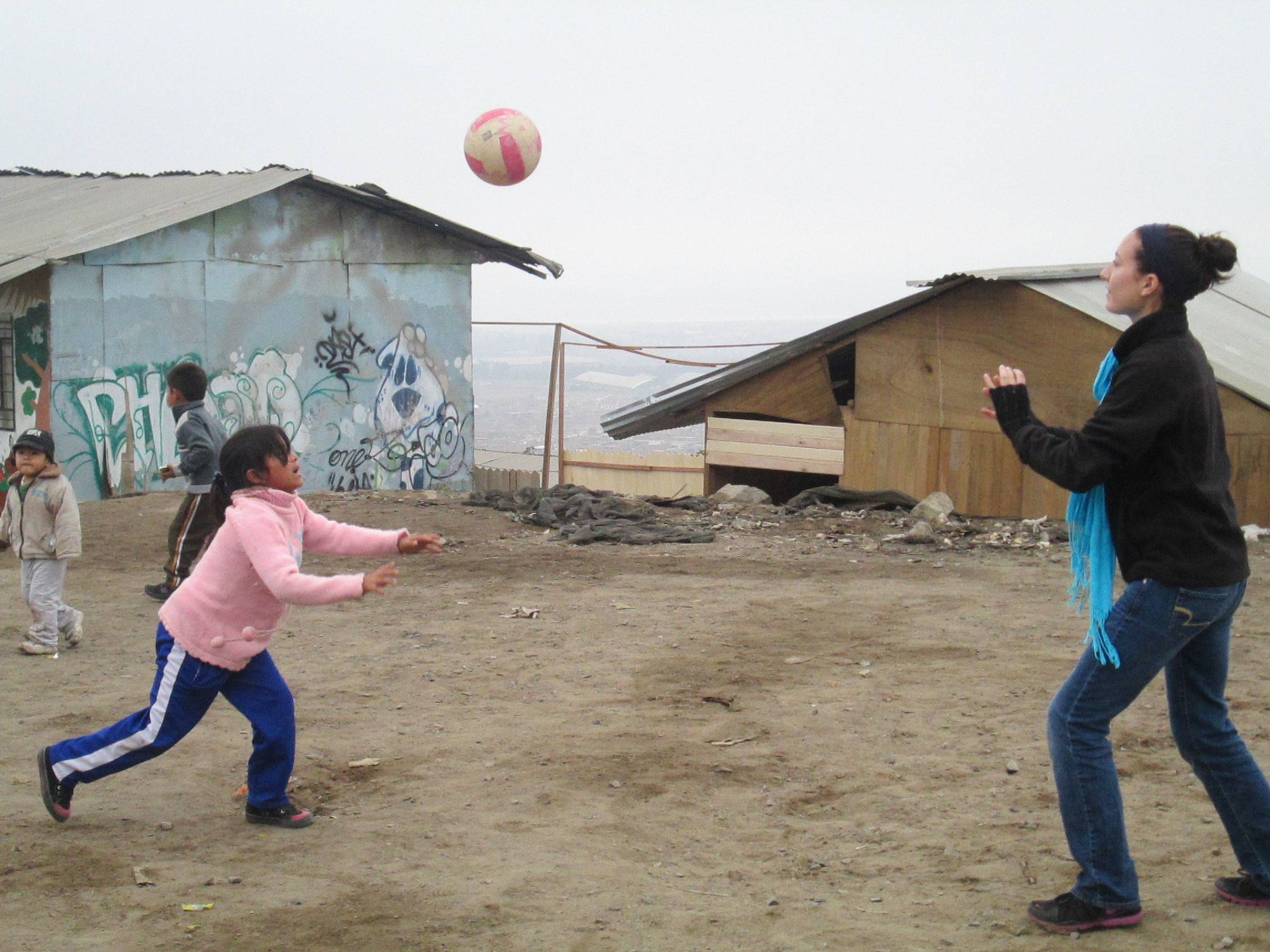
Finding a way to get past the language barrier.
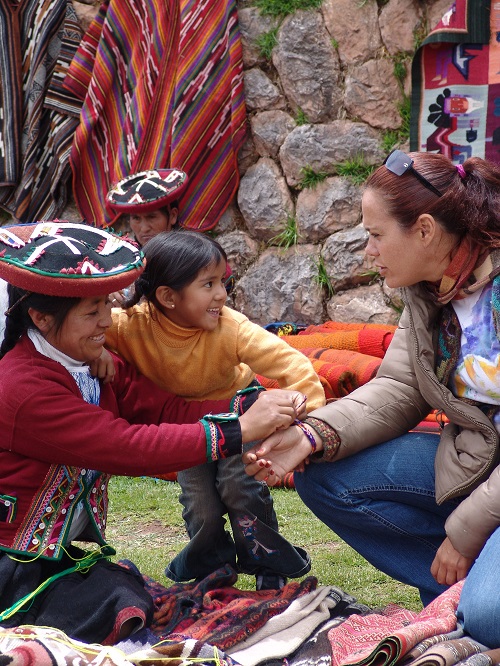
Interacting with local artisans.
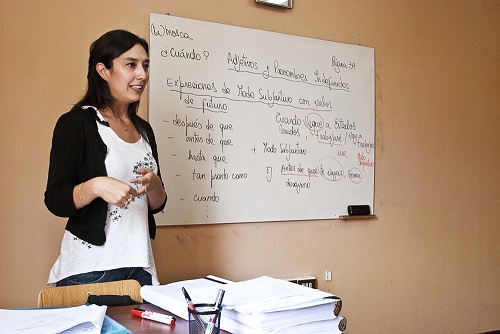
An Ecela Spanish instructor reviews the basics.
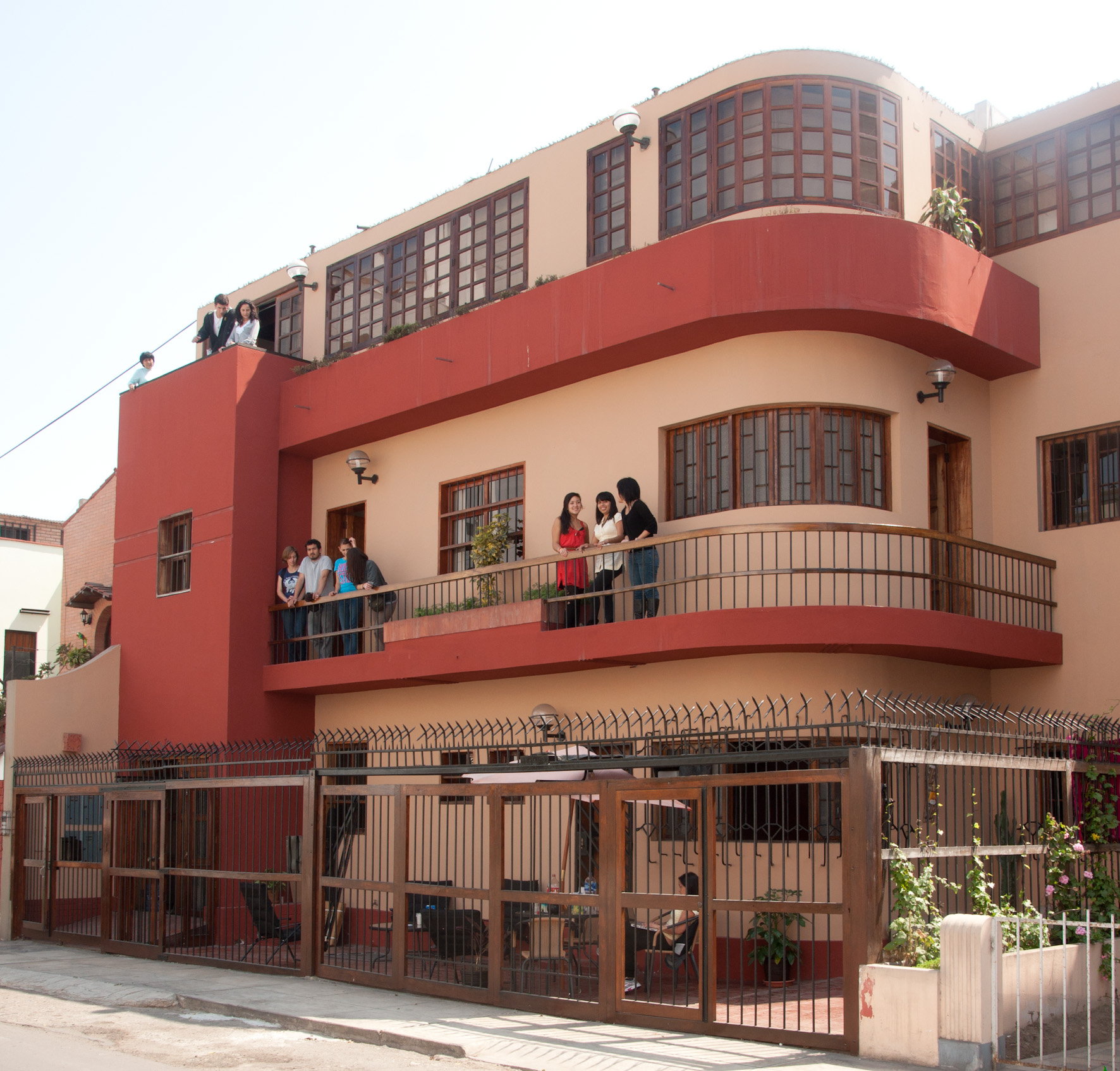
Outside Ecela Lima (Peru).
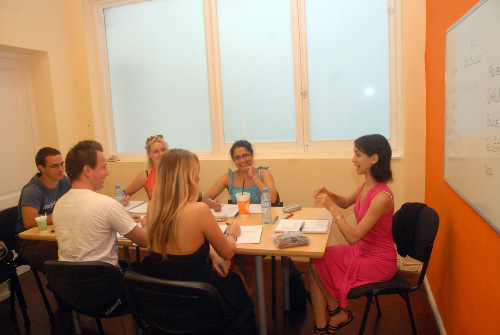
An engaging Spanish instructor keeps students interested, not watching the clock.
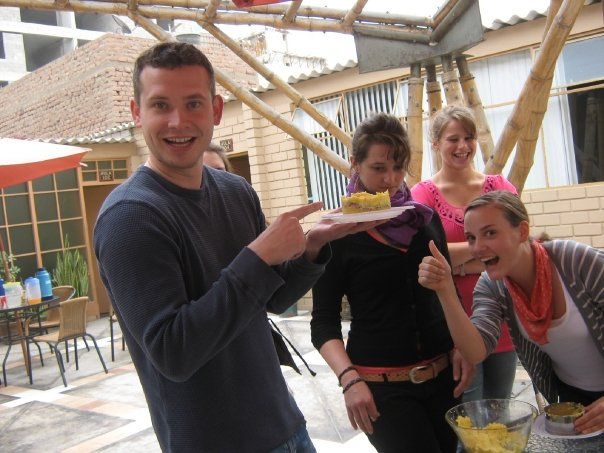
Trying Peruvian 'causa' - a potato based pie.
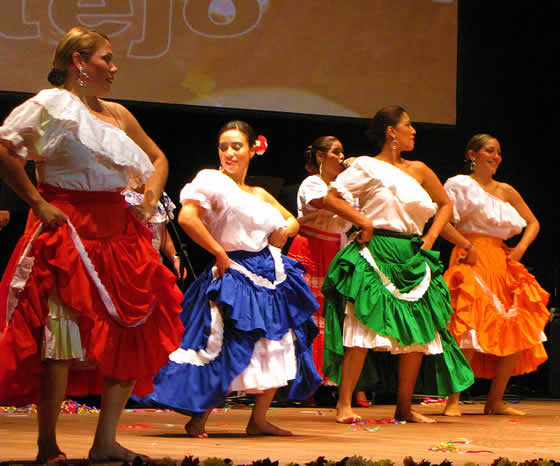
Traditional folklore show - Festejo.
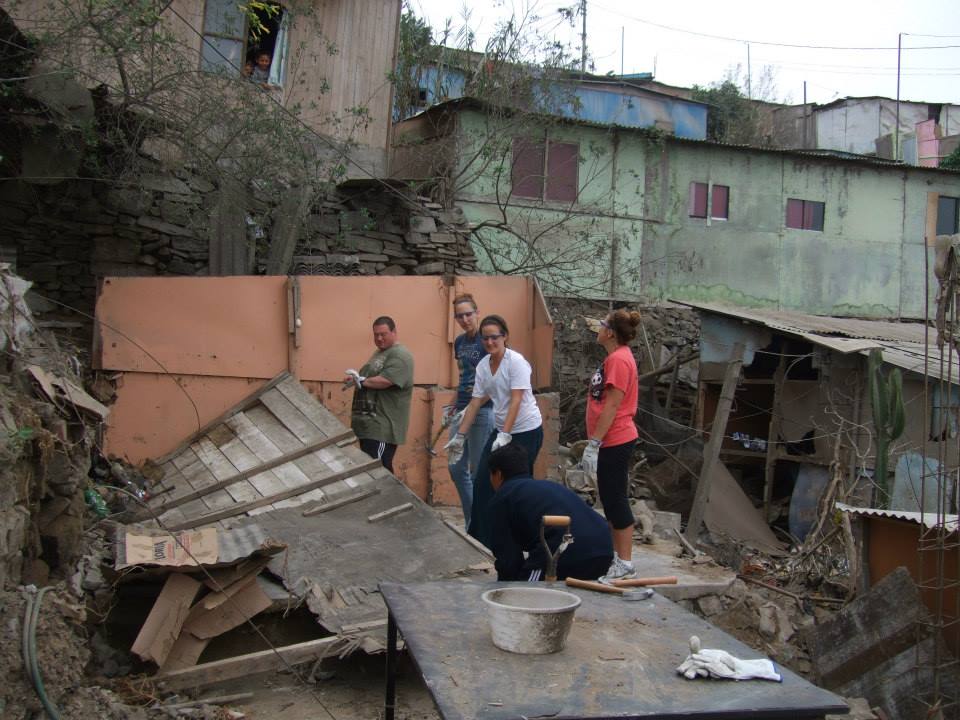
Participating in community development.
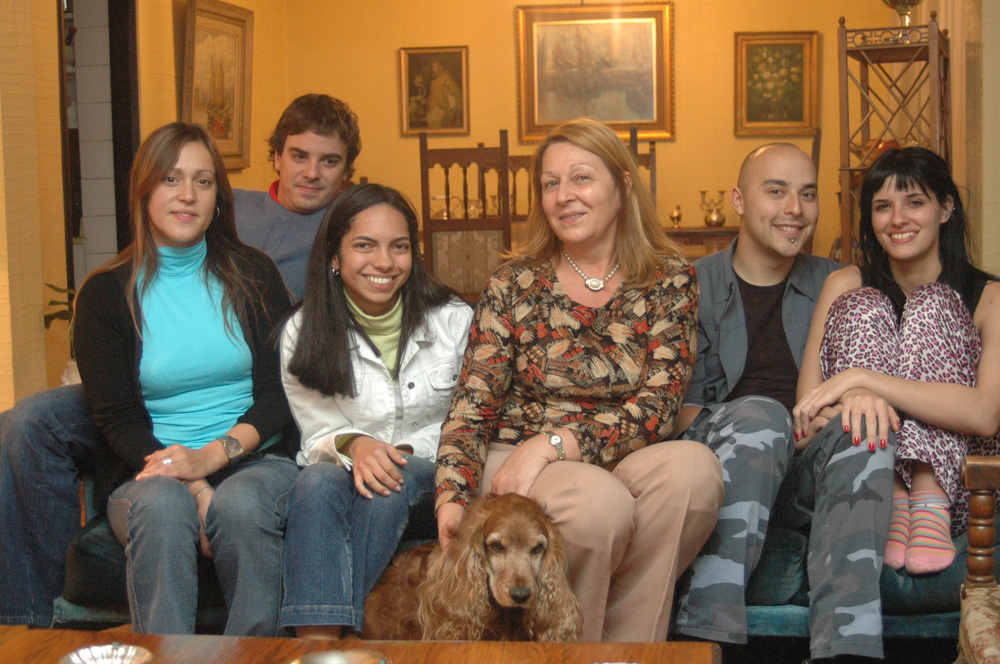
A family homestay, one of your housing option.
"The Need for Social Workers Who Speak Spanish is Acute”
The USA Has More Spanish Speakers than Spain?
Yes, the USA has more Spanish speakers than Spain. In fact, only Mexico and Colombia have more.
Soon, the USA will move into second place.
What does that mean for social workers and counselors?
What does that mean for you?
Of course, to meet that demographic reality, more and more hospitals require Spanish of their workers.
It only makes sense. It’s certainly a tiebreaker between two equal candidates.
Fair or not, ”it is what it is“
Other than perhaps counting to diez, it is true that most older counselors do not speak Spanish.
They are “grandfathered in.” their English-only ways accepted. Access to an interpreter is what they’ve come to expect.
Newcomers to the field do not have that luxury.
Belt-tightening organizations cannot keep staffing interpreters when so many other candidates speak Spanish more than adequately.
“An increasing number of clients request Spanish-speaking social workers each year."
Service organizations and career placement organizations nationwide agree on the glaring shortage of Spanish-speaking employees.
The St. David’s Foundation of University of Texas is dedicated to increasing the amount of bilingual social workers in Central Texas:
- Dr. Michael Wilson: “Without bilingual social workers, Spanish-speakers lose the opportunity to have their needs understood on their terms and in their language.”
- Jane Kretzschmar, a dean for the master’s program: “the need for social workers who speak Spanish is acute… an increasing number of clients request Spanish-speaking social workers each year."
- “Many times families come in and ask ‘Do you speak Spanish?'” Lorena Urbina said. “When I respond, ‘Yes’, I can see that this alleviates pressure and anxiety for the families about having to communicate in English.”
- “Often the adolescents are bilingual, so I go with their preferred language, but in most cases the parents are only Spanish-speaking.” – Daisy Thompson, St. David’s Foundation Scholar.
Administrators in eight out of 10 school districts say they don’t have enough Spanish-speaking counselors to serve the growing Hispanic population, according to a University of Florida study.
- “Parents need to be able to talk to a counselor about their child’s progress,” said Professor Harry Daniels, Chairman of the Counselor Education department at UF’s College of Education and a co-author of the study. “They need a place in the school system where they feel safe, where they feel their child’s needs are understood”.
- “Hispanic students who face mental health issues may find it difficult to trust or open up to English-only speaking counselors, and often need someone who speaks their first language,“ Smith-Adcock said.
From La Prensa in Riverside County (California): As the number of native Spanish speakers in California public schools rises, experts and educators alike say access to culturally competent counselors is key to future academic success – yet “such counselors are becoming an endangered species“.
- “I felt I couldn’t help my kids. I came to the school and there was no one who spoke Spanish,” remembers Alicia Loera, a 52-year-old mother of two.
- “I didn’t feel guided,” adds her daughter Evelin. “My advisor was not bilingual, so I had to translate for my mom. For me, it was very difficult because sometimes there were things I didn’t want my mom to know.”
- Loera says her inability to communicate with Lugo’s counselor prevented her from getting more involved in her daughter’s education. “When she did the translation, I asked her, ‘Are you telling me everything?’ My daughter would answer by saying she understood very little.”

My summer in Peru was one of my most memorable vacations ever. I enjoyed staying in the beautiful city, getting to know both Peruvians and other international students.
Ecela put me together with a host family who was loving and caring. They helped me improve my Spanish by talking with me every night.

My experience with ECELA was so much more than learning Spanish for a few hours a day.
The professors were extremely friendly and welcoming and it felt like we were more of a family than just students and teachers.
The staff were always telling us about some location that we had to visit, or even just grabbing some lunch or coffee to get to know us better.
Classes were never boring and always seemed to fly by.

I studied Spanish on my own a little bit, never in a school, but I took a short Berlitz language class in the US. They (ECELA and Berlitz) are not even comparable. ECELA is far better. Berlitz is world-renowned, but there is no comparison at all.
The teachers at ECELA are trained in linguistics and how to teach language. I’m just blown away by how good all of the teachers are.
How Will YOU Use Your Spanish to Help Your Community?
We ask prospective applicants like yourself why Spanish is important to their futures and have received hundreds of fascinating answers. Here are some of them:
“I am applying for PhD Counseling Psychology programs and I have realized the importance of being bi-lingual. I live in Colorado and I am learning about our higher rates of Latino populations in our community. I want to be an effective therapist for many people and I do not want language to be the barrier that prevents me from reaching many people.”
“I am aiming to do Social Work in Arizona, and hopefully work with refugees or immigrants, so it will greatly help me to be able to communicate with those Spanish speakers who cannot speak English.”
“My goal is to be a clinical social worker in urban environments (currently New York City) and want to be able to help as many people as possible. In most of the clinics that I’ve researched, clientele is largely Spanish-speaking.”
“I intend on being a licensed counselor in the state of Texas where the Spanish-speaking population is very large. I will be working in schools where students will have parents who do not speak English. If I can keep my students from being a translator, my job as a counselor will be better performed by not placing my students under that awkward pressure and stress.”
“It will allow me to serve more diverse populations. I also plan on moving to Miami, FL where Spanish is a pre-requisite for many counseling positions.”
"I am a social worker, working in New York City with immigrants and victims of human trafficking, many of which come from Spanish speaking countries. I would like to become fluent in conversational Spanish to better suit the needs of my clients.”
“My plan is to go into Correctional Psychology (aka Prison Psychologist). The biggest obstacle to the rehabilitation of inmates/offenders is a language barrier, and the Hispanic inmate population is rising. I will be better able to treat patients if I am able to communicate with them effectively.”
"I hope to go into counseling someday in the Chicago area. Possibly with specializing in victims of rape and sexual assault. Given the high Mexican and Spanish speaking population in the area, Spanish fluency would be immensely beneficial.”
“I hope to be a counselor for individuals who are in recovery from abuse in the home, or that have been rescued from some sort of bondage (sex trafficking, labor trafficking, etc). Spanish would help me in my career because I would be able to live and work in communities that have large Spanish-speaking populations, and I would not have that language as a barrier.”
“As an activist who hails from LA, I realize knowing Spanish is incredibly important to make sure social movements are accessible to all who are affected by issues of social inequality. After I graduate I intend to use my Urban Studies major to do community organizing and to confront the racial, economic, and gendered social divisions made visible in urban spaces.”
"I am applying to graduate programs in Arizona and for projects aimed at providing clinical intervention for Mexican-American families. The program will allow me to better communicate with our target group.”
“My intent is to stay in the medical setting working as a social worker with children. Nebraska has a high rate of Spanish speaking families and being able to communicate with them fluently would create rapport and increase likelihood of their trust with me as a professional.”
"I love it here. It's so cool and the class sizes are perfect...I wish I could stay forever."
"Overall it's a fantastic experience and well worth it."
Ana & Adora explain the class structure.
"...No Spanish when I arrived...just me and a dictionary"(trans).
"It has been an incredible experience. I've learned a phenomenal amount and have made many great friends."
"The teachers are amazing - they really know what they are doing and they really care about you."

Spanish & Human Services- Lima (Peru) - Summer 2016 Cost: $5,270
- 6 Weeks in the "City of Kings" Live & study in Lima, Peru. July 3 - August 13
- Human Services Field Exposure Additional Human Services Spanish role-playing and vocabulary classes, Volunteer work in real-world organizations. Plus guest lectures on the state of Peruvian social services.
- Earn 6 College Credits Six weeks of standard Spanish immersion course (equivalent to two college semesters) Academic transcript from Universidad Bolivariana.
- Live with a Peruvian family or with other students Most students choose to live with a local host family, but you can also choose to live with other students in a shared flat. (Housing is included in cost.)
Requires $25 application deposit.
Direct all questions to humanservices@ecelaspanish.com
Why Traditional Methods of Learning Spanish Often Come up Short - and Why Immersion Programs Work
Let’s face it: With traditional grammar drills, memorization and repetition-based teaching through high school, colleges, DVD’s, books, CDs, apps and even more being some of the most common ways in which students attempt to learn, is it any wonder why so many people give up or fail?
Unfortunately they are usually:
Too hard
Too long
Too boring
Too confusing
Too repetitive
Too ineffective
Here’s why…
- High school and college classes are usually filled with too many people – which means little participation opportunities and not enough time to focus on individuals.
- The mood is usually a very low energy as most of class doesn’t want to be there – they just need a grade.
- Often they are overly focused on grammar and vocabulary (because it’s far easier to grade than conversation practice, which ultimately is what you really need to excel).
- Learning times are structured using rigid scheduling which simply is not convenient to a busy lifestyle.
- Languages are being taught for only a few hours a week, and that simply doesn’t provide the consistency required for focused learning, so often people forget what they learned the last time they were in class.
Then there is the downside to self-study through books, DVDs, CDs, apps...
- You can learn on your own time, but unless you’re super disciplined, most of the time you will never get around to actually doing it — and even if you do — it generally doesn’t last for long as the distractions of everyday life will usually pull you away.
- Plus not having a teacher around to give you instant feedback makes it virtually impossible to know where you going wrong, what adjustments you can make to improve or if you are even progressing.
- Boredom usually sets in when wading through material because there is no social component, or conversational interaction with others, and it soon becomes a boring and lonely experience.
- Then you have books, DVDs and CDS which usually end up gathering dust in the corner or being given away in a yard sale.
- Also with so many apps on the market claiming to help you, it’s very easy to get overwhelmed and confused as to which one is really going to work, and how accurate their method of teaching is over the long haul.
"So what's the alternative?"
Fortunately there's a better way. You can learn Spanish at a fast pace while also enjoying yourself so much that it seems practically effortless.
The 9 Main Reasons Why Spanish Immersion Can Get You Fluent Without the Frustrations and Drawbacks of Traditional Education
We've come up with a list of the 9 main reasons that learning here could be more effective than any educational experience you've ever had:
- Single Focus Unlike a university situation where you're juggling 4-5 classes, or your home life where you're dealing with so many projects, going away specifically to learn Spanish lets you focus on that one thing, not wasting mental energy jumping all around.
- 360 Degrees of Spanish Not only in school but also out and about town, you're hearing and seeing your new language constantly, and little by little it sets in subconsciously.
- Community Support Ecela students are diverse - you could be in class with a middle-aged Brazilian lawyer, a young Swedish photographer, a retired Swiss journalist, and a college student from Florida - but everyone is moving in the same direction, yet not competing.
- Engaging Teachers Rather than focusing only on an instructor's academic background, we place a heavy emphasis on finding teachers who excel at connecting with students in a most supportive way. This keeps you looking forward to class rather than dreading it.
- Immediate Learning Incentives Since you will have the chance to use your Spanish the very same day you learn it, your studying is more relevant (and thus you're more receptive) than when learning about something you may never use.
- Grammar/Conversation Balance Traditional language courses are almost always way too grammar heavy - after all, it's easier to grade and easier to teach in large groups. At Ecela we dedicate a full 50% of class to conversation so you won't just be "good on paper".
- In The Now You will be mentally and physically in a different place than your past regrets and your future worries. This gives you what travelers call "heightened aliveness" and your mind is cleared for learning.
- Extra Small Classes With only a handful of students in each class you are receiving constant attention and don't find your mind drifting as you would in a "one lecturer to dozens of students" learning situation.
- Extra Speaking Time Between the small classes and the Spanish everywhere environment, you'll have constant chances to speak - the area most often ignored in traditional classes and even self-study.
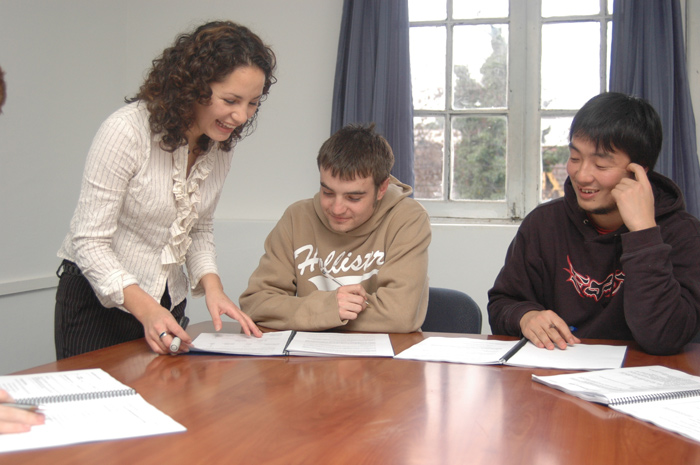
Extra small classes means lots of individual attention - and extra fast learning.
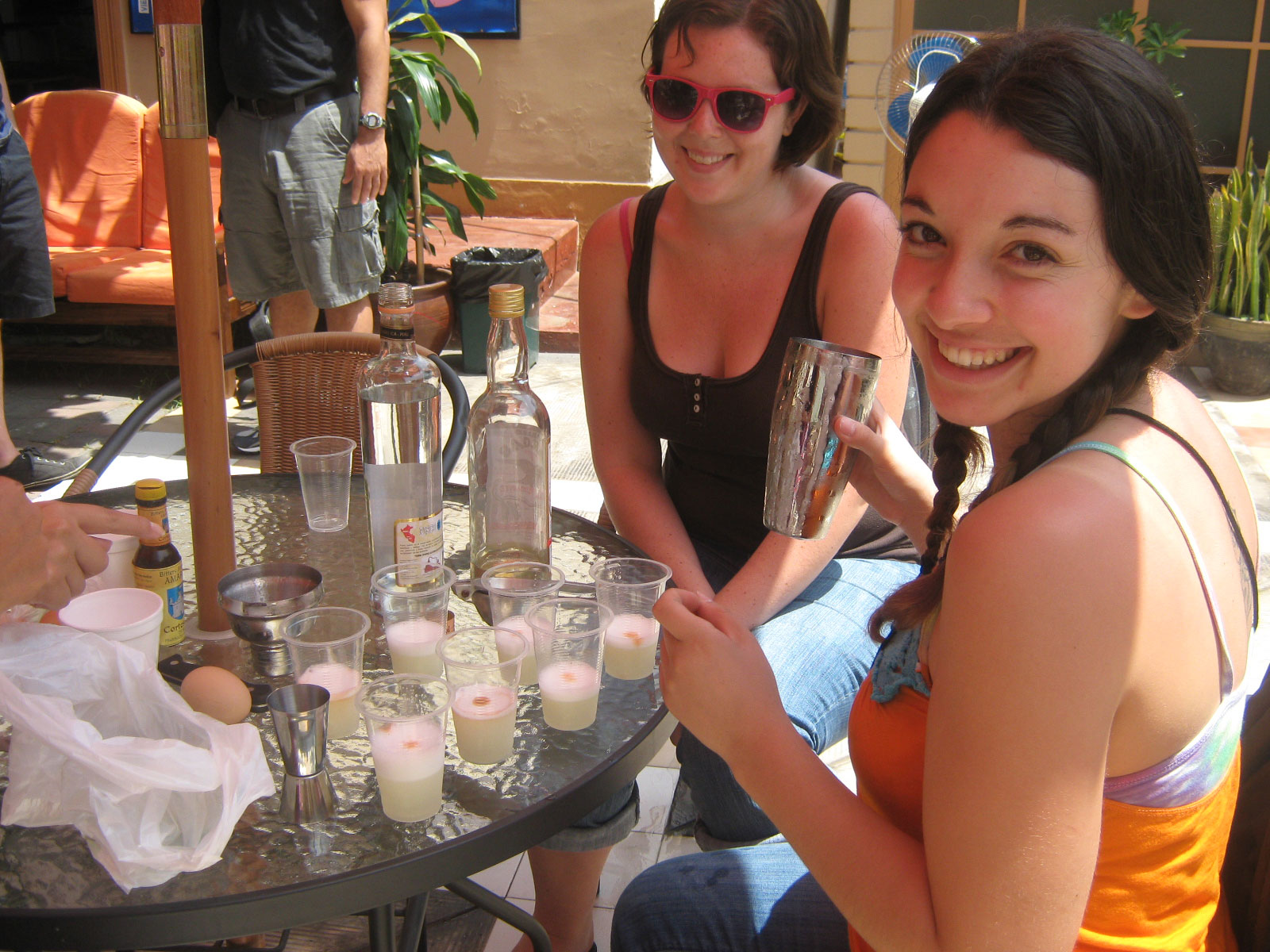
Enjoying a Pisco Sour, Peru's national drink.
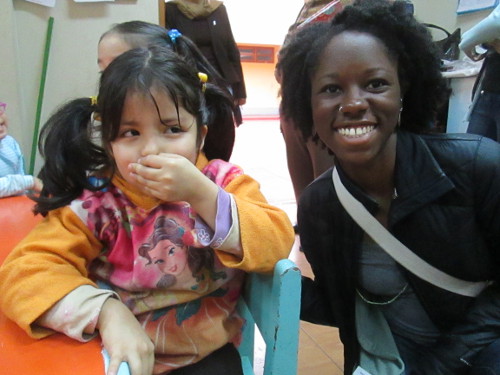
Volunteering at a local school.
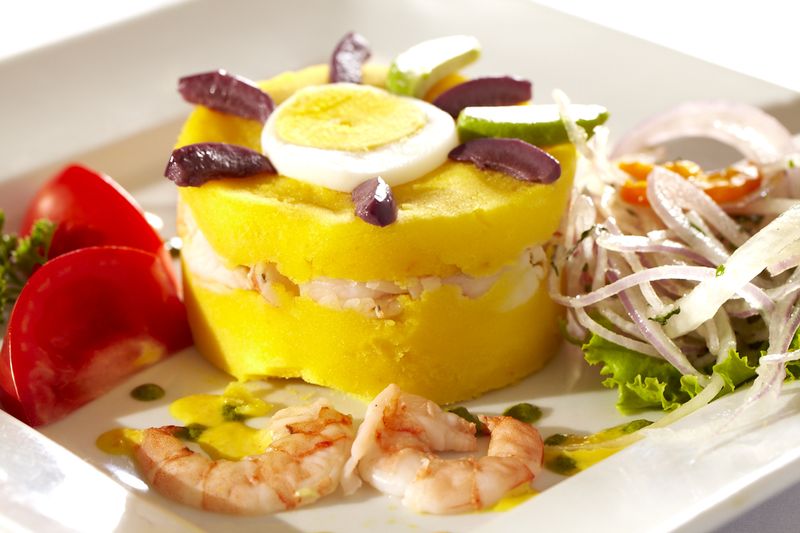
Peru is famous for its gastronomic delights.
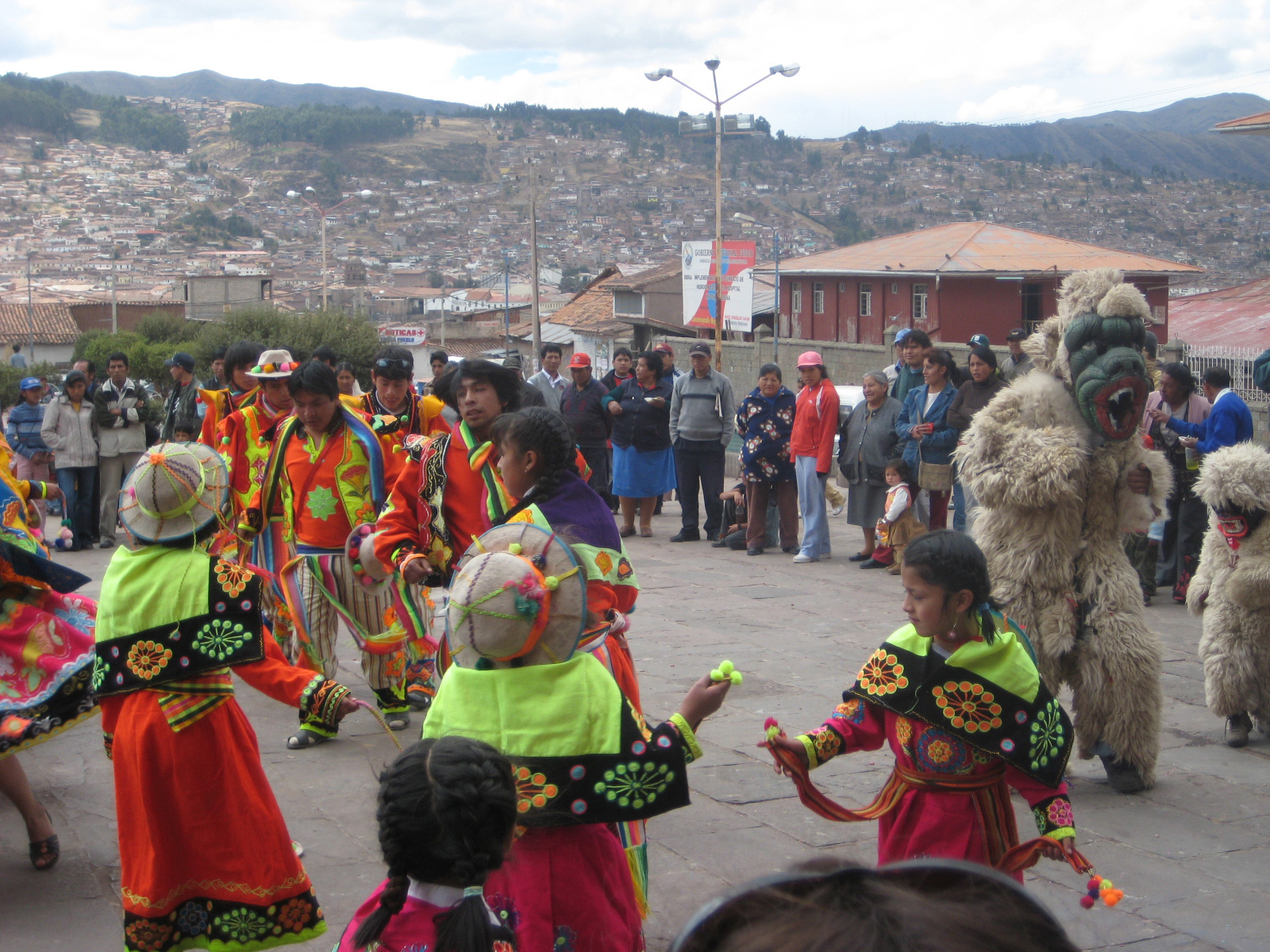
Watch, or even take part in, traditional local festivals as you explore the area.
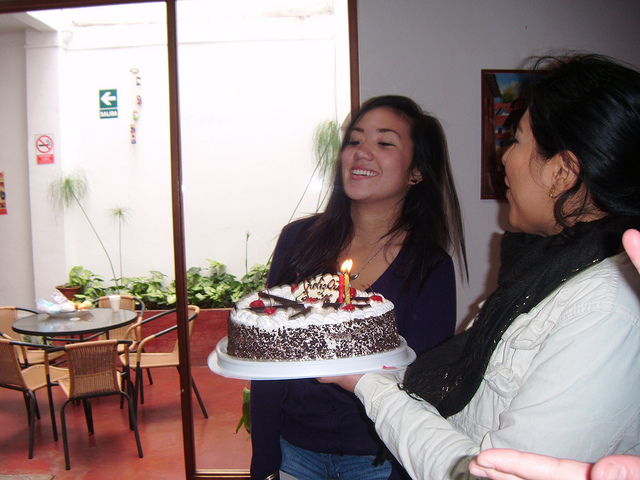
Surprise birthday party for a favorite teacher.
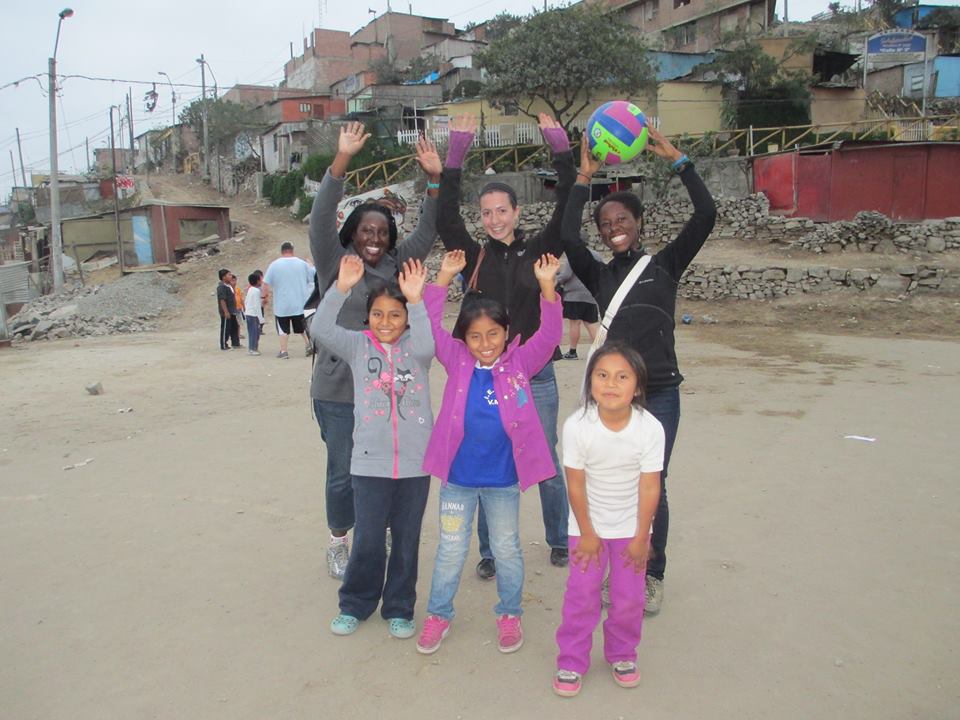
Ecela volunteers in a local community.
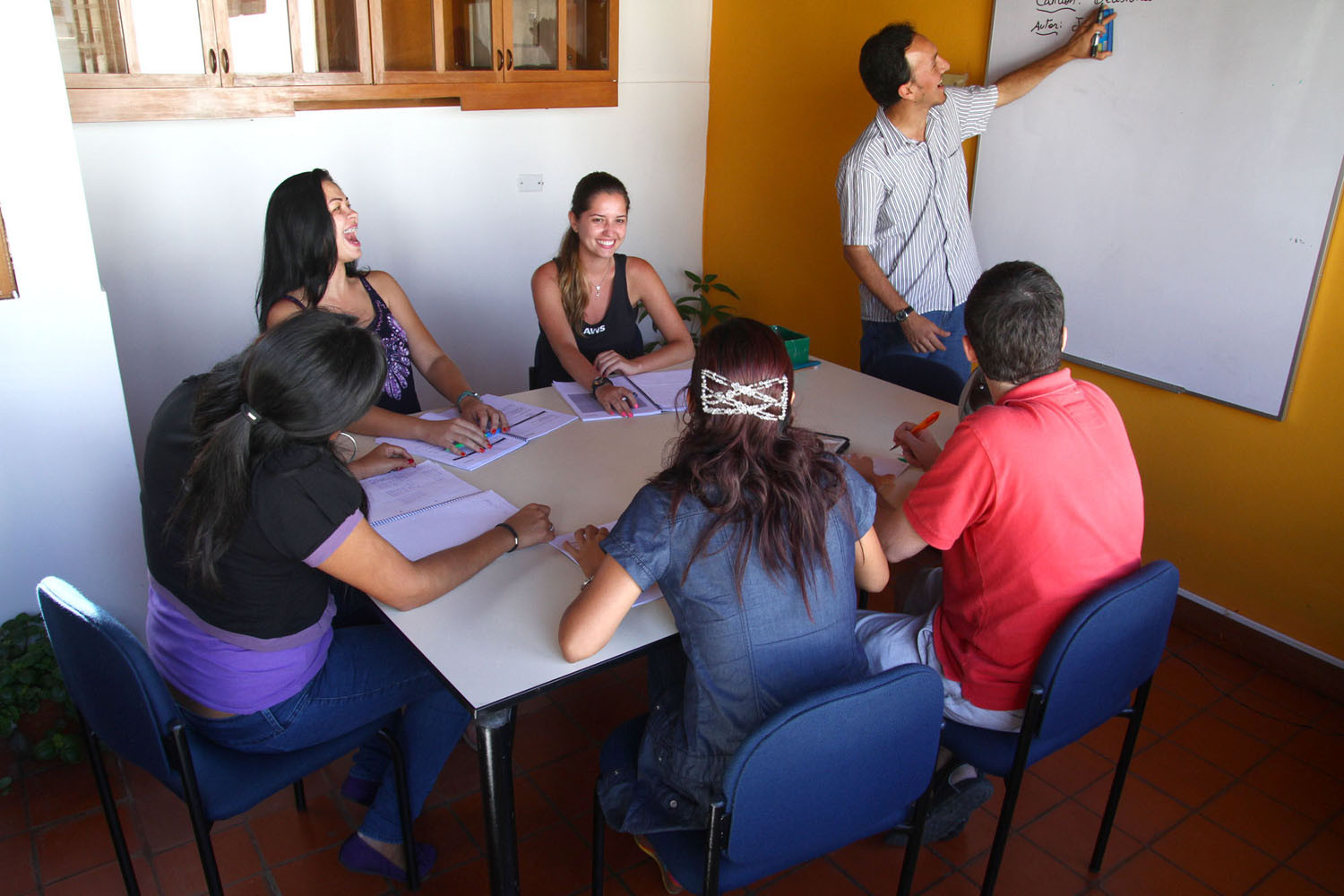
"For the first time in my life I woke up looking forward to class...and dreaded having days off."
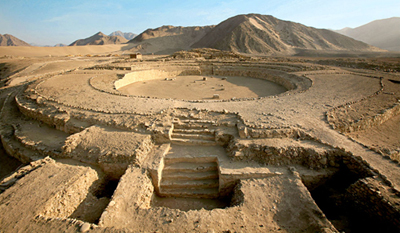
Ciudad de Caral - Popular weekend excursion trip from Lima.
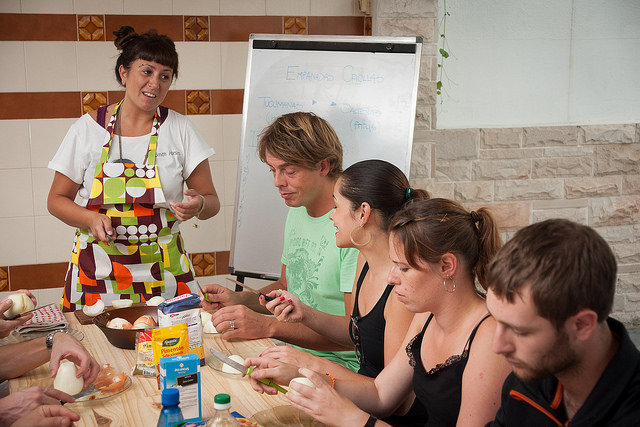
Learning to prepare Peruvian food
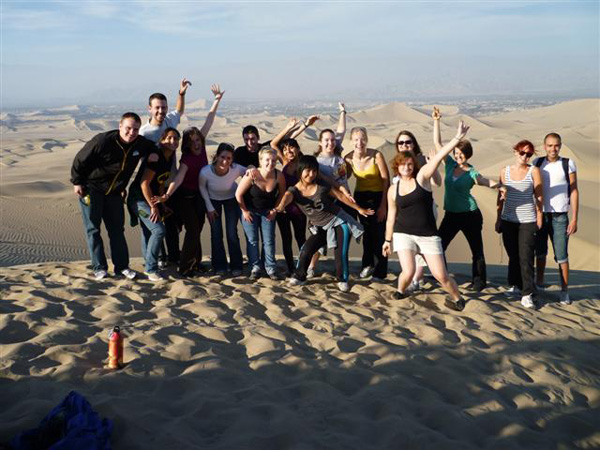
Sandboarding in Ica, Peru on a weekend excursion from Lima.
The Spanish & Human Services Program in Lima is Carefully Designed for Your Success

Extra small classes, a "Spanish everywhere environment," and a supportive learning community create a pathway toward language fluency.
Emily Caro shows the area for a community development volunteer project on the outskirts of Lima, Peru.
What you can expect during your Spanish immersion in Lima...
- Accelerate your learning with four hours of classes every weekday. Sounds like a lot, and the first day will be tiring. After that, you will thrive.
- Six weeks is equal to two full semesters of college Spanish. But you’ll learn MUCH more than that.
- Enjoy an engaged and dynamic classroom with a “useful in the real world” focus on conversation.
- Bond with like-minded students who share your passion for learning and travel.
- Benefit from extra small class sizes. Because our classes range between 4-8 students max, you’ll have tons of opportunities to participate, get personal feedback, and hone your skills.
- Because the classes are kept under eight students, the dynamic is more like getting coffee with a group of friends than just being another face in a crowded lecture.
- The conversation classes (50% of course time) are capped at only four students, intentionally designed to be intimate enough that even students “on the timid side” have no reservations about participating.
- Get a front-row seat to the real culture Live and play in one of the most popular small cities of Latin America while using your Spanish in real-life settings, speaking naturally and with confidence.
At Ecela, you’ll advance much faster than any other type of course or language program.
We have seen firsthand the results of “Immersion Plus” on over 15,600 students so far – from seven year olds that come on our “family eduvacations” to adventurous seniors that plan to retire here in South America.
It works on journalists from Australia, “gap year” travelers from the UK, lawyers from Brazil, diplomats from France,
....and, of course, social sciences students from the United States.
Social Work Field Experience in Lima
The special program includes a significant amount of exposure to Peruvian social systems:
- Guest lectures. Professionals explain the history and current realities of Peruvian social systems.
- Extra counseling Spanish lessons. In addition to the standard program, you’ll have role-playing and vocabulary sessions focused on social services.
- Community centers. For hands-on participation you will be invited to volunteer in the planning and building of community centers.
- Store your experiences as a “conversational topic bank” for future job or graduate school interviews. Being interesting is often as important as being qualified.
While You’re Here…Earn 6 College Credits
The program includes a transcript from Universidad Bolivariana to transfer credits to your school (or to save for a graduate program).
- Two college courses may not sound like much, but they can come in very handy down the road when you are overburdened with requirements for graduation.
- Since you will actually advance much more than in a usual class, your NEXT class (in college or elsewhere) should be much easier.
- Note: The credits should be seen as a mere “extra.” A “nice to have” If you are coming just to meet degree requirements, you’d be coming for the wrong reasons.
Inside a fundamentals (grammar) class.
Experience Peru Thru Its Culture
Your program is not limited to Spanish class and human services trips. We also provide a full calendar of events to make sure you experience Peruvian culture.
- “Learn” (or watch) how to cook Peruvian food, widely considered the finest on the continent.
- Make sure to take advantage of the salsa dance classes to impress your friends when you get home.
- Lima, with many archaeological sites within and outside the city, is sometimes called a “living museum” and we’ll take you to the most important spots.
- On the weekends visit colonial villages, explore the coast, venture to the tempting and seductive Amazonian jungle, or just stay in town and enjoy Limeño life.
“What is a typical day like?”
You’ll be spending four hours a day in class.
Again, it sounds like a lot…but the classes are fun and go by fast. In addition, there are many cultural and social activities – from cooking lessons to “Cinema Latino” – at the school. It will be your home.
- 7:00 AM: Breakfast. Join your host family and fuel up for the day.
- 7:30 AM: Spanish warm-up. (recommended) Review yesterday’s lessons and look ahead to today’s.
- 8:30 AM: Walk to school. Meet up with another student or two to go to school together.
- 9:00 AM: Grammar class. (max 8 students) Review and drill the language fundamentals.
- 10:40 AM: Break. Catch up with your new friends over free coffee and tea.
- 11:00 AM: Conversation class. (max 4 students) Heavy-duty practice, with instant feedback, in a welcoming setting.
- 12:40 PM: Lunch. Go to one of the many local, inexpensive restaurants with some classmates. Invite your teacher once in a while.
- 2:00 PM: Human Services component. Varies between volunteer work, field trips, guest lectures, and specialized Spanish lessons.
- 5:00 PM: Cultural activity. (optional) Learn more about the Peruvian culture: cooking classes, dance lessons, museum tours, etc.
- 7:00 PM: Dinner. Home cooked Peruvian meal with your host family.
- 8:00 PM: Homework. Today’s assignments.
- 9:00 PM: Out. Meet up with friends to take in a live music show or just to people-watch.
“Where Will I Live?”
There are two housing options – you can’t go wrong with either. Our students choose them about equally:
Shared apartment with students:
- Live in a shared “flat” with other program participants and other young students staying in Lima.
- Prepare your own meals (or go out). Share a living room and kitchen with your flatmates while enjoying your private bedroom.
- Use your apartment as “the meetup” before heading out to Lima’s seemingly endless amount of night spots.
True immersion with a host family:
- Gain extra Spanish practice as you bond with your nueva familia over breakfast and dinner.
- You’ll have even more cultural opportunities – don’t be surprised if you’re invited along to birthday parties, weddings, and other fiestas tradicionales.
- You are still free for lunch to eat with your school friends at any of the many Peruvian (and other international flavors) restaurants near the school. You’ll love how inexpensive, yet delicious, restaurant food is in Peru.
- Suggestion: Bring a small gift from your home region for your host. (Your local airport is a great source.) It will “break the ice” on the first day and give them something to always remember you.
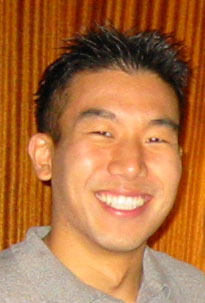
"Going on one of these trips is absolutely one of the best decisions I’ve made in my life.
It’s better than just traveling or vacation because you actually gain some skills from it. I’ve met about 200 people, ranging from 19-75 yrs old.
There were students, pilots, dean’s of universities, teachers, VPs of companies, small business owners, lawyers, etc. from all over the world."

My experience at the school was nearly perfect. I met a lot of nice, friendly people, students and instructors alike.
The instructors are fun, dynamic, and really smart, and they have so much patience! The school is really organized and hardly ever has any problems.
The people here always want to help. They’re friendly and fantastic!!

These 3 weeks have been fantastic. I’ve met so many nice people from all around the world. The teachers are really nice, and they make the classes really fun. You learn so much in the classes!
If you have the chance to volunteer, I highly recommend it. It’s a beautiful, unique experience. Seeing the poor children smile brightens up your day. Volunteering doesn’t feel like work, it’s more like having the opportunity to do something good for someone else. In the end, the kids are as happy as the volunteers.
Peruvian food is delicious. There are so many tasty fresh fruits and vegetables. Some of the dishes you should try are ceviche, tamal, and definitely chicharrón!
And obviously Peruvian people are so friendly. I always felt safe. You do have to get used to the traffic; you could say it’s a bit wild and crazy, but honestly I miss it now. There’s always something going on in the streets; it’s never boring!
I LOVE LIMA!
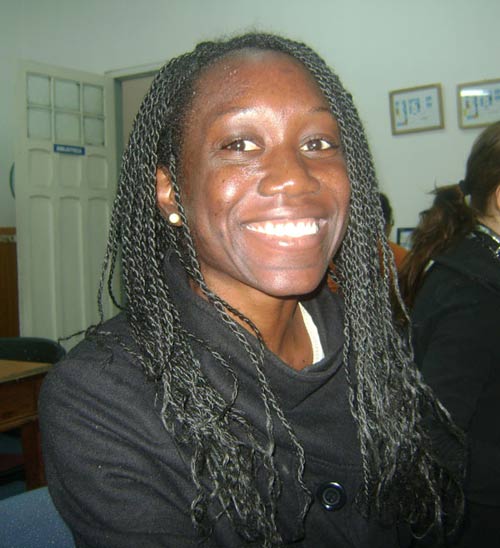
When I decided to study at Ecela, I was looking for a school that had good classes and a comfortable environment.
But when I got there, I had a better experience than I ever could have imagined.
The class structure was organized, and the small classes helped me learn quickly. The school’s staff was really kind and professional.
Also the school’s excursions are a great opportunity to learn outside of the classroom. The salsa classes and the barbecues were the most fun.

I compared a ton of schools when I got to Peru. ECELA is a very familiar school in the best sense! I’ve learned a lot, and not just the Spanish language.
The conversations with my instructors were the most important part in my opinion! That way I could learn a lot about the Peruvian people, their culture, and their thinking.
I don’t have to go back to Germany just yet, so I hope that we can see each other outside of school!!

I could not have been more pleased with my progress in Spanish, and happy with my experience in general.
Both the excellent staff and instructors were professional, kind, and helpful. The feeling they were able to convey was that they not only wanted to help with the advancement of the language, but that students felt comfortable and confident navigating a new city, language and culture.
Thank you again for this experience. Thank you for making me feel that I was more than just a language student."
Why Lima, Peru is a "Mini United Nations," a Gastronomic Pleasure Center, and a Travel Guide Favorite
Lima, Peru – a “mini United Nations?”
For many international travelers, Lima is a mere stopover on the way to the glamour cities of Buenos Aires or Rio de Janeiro. In that case, you wouldn’t give it a second glance and probably would stay in the airport.
Yet, arriving visitors are continually overwhelmed by the international flavor.
Why?
Apart from the constant flood of archaeological tourists from around the globe, Lima also has many international “expats.”
You see, with its pleasant oceanside climate, super low prices, and welcoming population (both the locals and the other foreigners), many travelers decide to stay, opening restaurants and shops typical of their homeland.
- Go for a “pub crawl” or to a “de moda” club and you’ll see a mix of Australians, Swedes, French, Brazilians, Argentines, and of course Americans, among the several dozen resident nationalities.
- Enjoy international food selections normally reserved for only much more “sophisticated” cities. Whatever your favorite ethnic food, chances are you’ll find it in Lima.
- Make friends with foreigners that have been there for months, or even years, and they will show you spots far better than anything recommended by tour books.
South America’s Best Food
Peru has a well deserved reputation for having the best food on the continent. You must try: (source: National Geographic)
- Ceviche If Peru had an official national dish, it would probably be this preparation of raw fish marinated in citrus juice. The dish is usually spiced with red onion and aji pepper, and served with sweet potato or choclo, an Andean corn.
- Rocoto Relleno What appears to be a plain-old red bell pepper is actually a fiery Capsicum pubescens, stuffed with sautéed ground beef and hard-boiled egg. This is topped with melted white cheese, baked, and served whole.
- Alpaca In the Andean highlands, this camelid (a smaller cousin of the llama) has also been a source of meat for centuries. The taste is similar to buffalo or other grass-fed meats: somewhat gamier than beef and very lean.
- Lucuma A tree fruit that looks like a mango, but it has a custardy taste akin to maple syrup. It’s usually used as a flavoring in desserts, and is justifiably popular as a variety of ice cream.
What Do Travel Experts Think of Lima?
Lima, Peru is an incredible place that you’ll love. But don’t take our word for it. Here are excerpts from some respected guidebooks:
Fodor’s: “When people discuss great South American cities, Lima is often overlooked. But Peru's capital can hold its own against its neighbors. It has an oceanfront setting, colonial-era splendor, sophisticated dining, and nonstop nightlife.
"During the past decade the country has enjoyed peace and steady economic growth, which have been accompanied by many improvements and refurbishment in the city. Residents who used to steer clear of the historic center now stroll along its streets.
"And many travelers who once would have avoided the city altogether now plan to spend a day here and end up staying two or three.”
Lonely Planet: “When fog bundles its colonial facades and high rises, Lima's enchantments come across as all too subtle. To enjoy it, climb on the wave of chaos that spans from high-rise condos built alongside pre-Columbian temples, and fast Pacific breakers rolling toward noisy traffic snarls. Think one part southern Cali doused with a heavy dose of America Latina.
But Lima is also sophisticated, with civilization that dates back millennia. Stately museums display sublime pottery; galleries debut edgy art; solemn religious processions recall the 18th century and crowded nightclubs dispense tropical beats. No visitor can miss the capital’s culinary genius, part of a gastronomic revolution more than 400 years in the making.
"This is Lima. Shrouded in history, gloriously messy and full of aesthetic delights. Don’t even think of missing it."
Frommer’s: “Once South America's richest city, Lima was hailed the City of Kings by Spanish conquistadors. If you look beyond the urban sprawl, you'll be rewarded with the National Museum's pre-Columbian treasures and Plaza Mayor's colonial splendor.
"But ask Limeños what makes their city tick and they'll most probably wax lyrical about ceviche (lime-marinated seafood) with pisco sours by the Pacific and Barranco's pulsating Afro-Peruvian peñas (folk nights). A mix of colonial heritage and Latin passion, grime and glamour -- Lima is a tantalizing appetizer of what Peru has to offer.
"I finally felt like I could converse in Spanish."
"The school is great, Lima's a great place to study."
"There's been a lot of cool activities to do"
"Overall Peru has been awesome...definitely a life-changing experience and an eye-opener."
"Everybody's super friendly and I feel comfortable making mistakes in front of them."
"I liked the small classes...it's a richer learning environment in my opinion."
"My homestay made me feel so special. They went above and beyond to take me around the city on my first day."
"I highly recommend a homestay so you can get the culture as well as learn your Spanish."
"I' knew absolutely zero Spanish when I got here."
"I met so many people...new friends from Switzerland, Germany, Australia."
"So How Much Does This Cost...and What's Included?"
The program cost is $5,270 and includes:
- Dates: 6 weeks July 3 - August 13
- Tuition – 6 weeks of Spanish classes and 6 semester credits - but you'll learn WAY more.
- Human Services Components – you will have the opportunity to shadow Peruvian social workers, volunteer with local organizations and to participate in a community development project.
- Cultural and Social Activities – including walking tours, music class and cooking class.
- Homestay with Meals – full immersion in the local culture by living with a host. Includes breakfast and dinner.
- Welcome Reception and Orientation – helps you to get to know your classmates and familiarize you with the local area.
- Personalized Assistance – our Admissions Team in the USA will help you to prepare for your study abroad experience.
- On-site Resident Director and Support Staff – will help with any questions or advice you may need while in Peru.
- Official Transcript – upon completion of your program, an official transcript issued by Universidad Bolivariana will be sent to your home institution.
"Count Me In...What's Next?"
The application process is simple:
- $25 Application Deposit (Pay here.)
- Application Choose session, complete questionnaire, schedule phone interview (15 minutes to complete).
- Phone interview with an Ecela Immersion Counselor.
- Notification of acceptance status within 48 hours.
- If accepted you will have 15 days to secure your spot with a $500 deposit.

Apply for Spanish & Human Services Lima, Peru 2016
Pay your $25 application deposit and then complete a short questionnaire.
Direct all questions to humanservices@ecelaspanish.com

Ecela Cinco Estrella Garantía
Our five-star guarantee promises you an exceptional educational experience every week of your program, or you get TWO extra weeks absolutely free.
We guarantee…
- Your right to change schools If you feel a change of scenery would be beneficial, simply let us know a few days in advance and you can switch - at no extra cost.
- Significant Spanish improvement You will make substantial advancements in your Spanish each week, by YOUR standards.
- Thorough course enjoyment You will look forward to class each day and to spending more time with your instructors, your classmates, and the Ecela staff.
- Comfortable environment You will find our school facilities comfortable, clean, and inviting – more like a home than a language institute.
- Friendly treatment by staff As a welcome guest of ours, we don’t consider you just another language student. You will be treated like part of the Ecela family by all of us.
“Our goal is to help you have “one of your best experiences ever” and we will want the chance to “make it right” if we fall short.
"If you feel that we failed at any of the above, at any time during your program, just let me know and we will give you two extra weeks of classes, to be used at any of our schools, absolutely free – no questions asked.” - Cecilia Quezada, Director of Services
I found ECELA Lima and, from the beginning, knew I had found the perfect match.
"After researching many study abroad programs in Latin America, I found ECELA Lima and, from the beginning, knew I had found the perfect match. The staff and administrators at ECELA are wonderful; they are so helpful, organized, and very friendly—they work hard to keep each student happy.
The professors of ECELA Lima are also gems: they are effective teachers, enthusiastic, make learning Spanish fun, care deeply about students, and are always available for extra help. In fact, since returning to the U.S., professors have continued to be available whenever I have any questions.
Finally, I loved studying in Miraflores, a beautiful neighborhood of Lima, right by the ocean and close to a major shopping/entertainment complex. There is plenty to do in the city—visit ruins, museums, & downtown Lima; try the many fabulous restaurants; enjoy the great nightlife, and make exciting weekend trips to experience beautiful Peru (Cusco, Nasca, Arequipa, among many other places) .
My last recommendation—try the alfajores (a type of pastry) at Havanna, in Larcomar. So delicious!"

What goes on in this school is an unforgettable experience.
"I’ve been to four of ECELA’s schools, and as a Spanish teacher I applaud their efforts in creating an enjoyable atmosphere for learning Spanish at all levels from beginner to advanced.
They are more than just language schools, they are learning communities that support the sometimes challenging process of learning another language. The teachers and support staff are the key to the success. The schools in Peru have been a very special experience for me.
I was pleasantly surprised by my experience in Lima. It exceeded my expectations in all ways. The city is exciting, the views in Miraflores are beautiful and the school was thoroughly enjoyable."

I was impressed by how friendly the people were.
"When I walked into Ecela the first time, I was impressed by how friendly the people were. I could participate in all of the activities even without being enrolled. After a while, they convinced me to take classes, and it was worth it.
What goes on in this school is an unforgettable experience. There are people from all over the world, from different cultures, and everything works so well. I thought it was good that we used what we learned in class in the activities during the afternoon and at night. That way, you learned things much more quickly. Especially those who were new to Ecela. The school is truly a wonderful thing."

Not only did I have the time of my life through this experience, but my Spanish skills also improved dramatically.
"I want to tell you about my fabulous experience through ECELA in Lima, Peru. I spent a total of 2 months in their Spanish programs, and loved every minute of it.
It is obviously nerve racking to travel to a new country and learn a new language, but ECELA does an amazing job of helping you bridge that process into an easy transition. All of the staff is very knowledgeable and always there to help.
There are students at every level, and the professors make the language learning process fun and easy. Activities are coordinated within the school for the chance to explore the wonderful city of Lima, and even further into Peru. I personally did extra traveling on my own, and the ECELA staff helped me with everything I needed.
I also became very well acquainted with the other students, through both classes and the school’s activities. Not only did I have the time of my life through this experience, but my Spanish skills also improved dramatically, and I developed a whole new confidence in my Spanish language ability."

Frequently Asked Questions Spanish & Human Services in Lima, Peru
Who is the Spanish & Human Services program for?
Our summer program in Lima, Peru is designed for future social workers and counselors who anticipate using Spanish in their careers. The ideal student:
- can live without all the creature comforts of home
- enjoys meeting new people and is culturally curious
- has a desire to witness social services in action
- has a genuine interest in learning Spanish
Who is the Spanish & Human Services program not for?
You will not be happy if you:
- only want to do the program to “stand out” on grad school and job applications
- only want Spanish for the college credit and don't have a genuine desire to speak the language
- need a high-comfort environment
How do participants receive academic credit?
You will receive a transcript from Universidad Bolivariana (South America). If your university is cooperative (most are) you will receive credit for two Spanish courses, though you will learn significantly more than in two traditional college courses.
What is the minimum level of Spanish required?
There is no minimal level of Spanish. Our school has complete beginners all the way through people that teach Spanish themselves.
Beginning students will advance the most, yet understand the least. It will be frustrating at first, yet by the end you will be surprised at your abilities.
How much will my Spanish advance?
Technically the program is two college semesters, but you should increase your language abilities far more than that. The reasons for superior learning include:
- more class hours – 120 with Ecela vs. 90 in college
- much smaller classes and far more individual participation
- surrounded by a “Spanish everywhere” environment
- focus on one class instead of four or five
Can I take extra Spanish classes?
If you have the time, we recommend spending an extra two or three weeks with us (at any Ecela school). We have special pricing for participants in the Spanish & Human Services who would like to extend their program.
What’s included in the tuition?
Your $5,270 tuition includes:
- all Spanish instruction
- all course material
- additional Spanish classes focused on counseling Spanish
- academic transcript
- housing with private room, includes breakfast and dinner
- human services component (shadowing, guest lectures, field trips)
What additional costs should students expect?
You should also budget for:
- plane ticket to Lima, Peru
- “walking around” money (lunch, snacks, entertainment etc.) about half what you pay in North America
- souveneirs – gifts for family and friends back home
- optional school activities. Out-of-class activities and excurions are optional and you pay only for the ones you want. Usually they are inexpensive – for example, the cooking class everyone puts in a few dollars (and gets to eat the food)
Ecela Students Share Experience, Offer Advice
Listen in as Veronica Vilski, host of Planeta Ecela, interviews students to get an in-depth report of their experiences and to hear what advice they have for future students. Each talk is about 15 minutes long and well worth it if you are considering this trip.
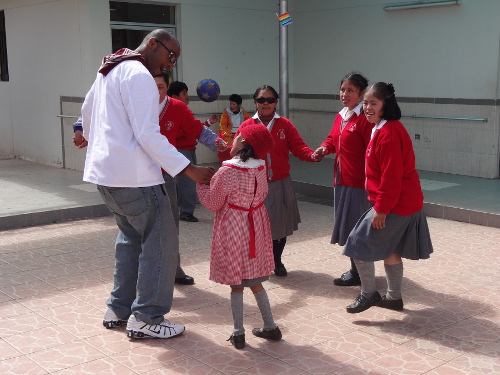
Joseph Brewster is an ambitious University of Texas College of Pharmacy student who has traveled the world before even completing his final year.
Joseph is passionate about studying abroad and truly has a heart for people. He gives some sound advice about communicating without being able to communicate at first as well as shows how far even a six-week Spanish immersion program can take you.
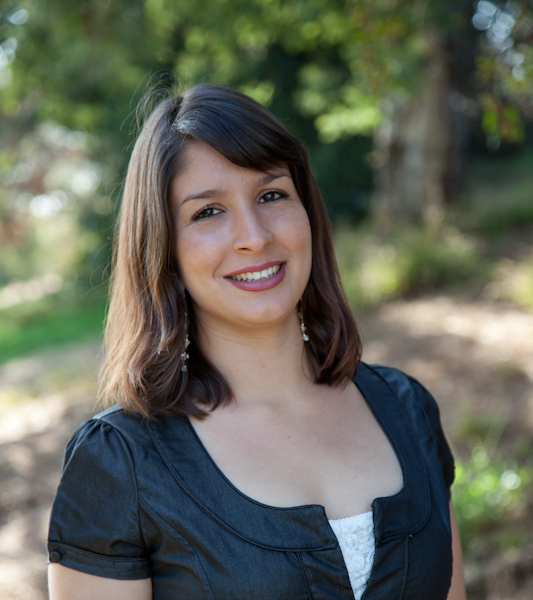
Sara Mokhtari-Fox is currently teaching English in Cusco, Perú, but she got her first taste of Latin America through classes with ECELA in both Lima and Cusco.
Sara shares her heartfelt advice with us while keeping a good sense of humor about the positive aspects—and tearful challenges—of learning a new language in a program abroad.

Apply for Spanish & Human Services Lima, Peru 2016
Pay your $25 application deposit and then complete a short questionnaire.
Direct all questions to humanservices@ecelaspanish.com
If you made it this far, congratulations.
We threw a lot of information at you and scared a lot of people.
If you choose to move forward, I'd like to propose a bet with you.
One Peruvian Sol (about 40 cents). I'm going to confidently predict two things...
PREDICTION #1 When you arrive you'll be very uncomfortable and say to yourself "What have I gotten myself into?" You'll be thousands of miles from home, won't understand the language, won't know your way around, and won't have any friends or family to help you.
PREDICTION #2 When you leave, on the very last day when you say goodbye, you will cry. A lot. Even if you're "not the emotional type." You will wish your experience could last forever.
And when Prediction #2 comes true (and it almost always does) we know we've done our job.

Cecilia Quezada, Director of Services
P.S. The program is limited to 35 total students. We have made the application process as simple and as low cost (only $25) as we possibly can.
To avoid missing out on your summer in Peru, apply here while we can still save you a spot.
Direct all questions to humanservices@ecelaspanish.com .